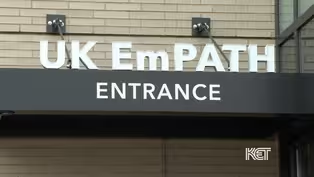
Getting Back on Schedule
Clip: Season 3 Episode 43 | 2m 21sVideo has Closed Captions
Pediatrician on importance of getting kids back on sleep routine before school starts.
A pediatrician at Norton Children's Hospital is encouraging parents to map out a sleep schedule for their children to make sure they're well-rested and ready for school.
Problems playing video? | Closed Captioning Feedback
Problems playing video? | Closed Captioning Feedback
Kentucky Edition is a local public television program presented by KET

Getting Back on Schedule
Clip: Season 3 Episode 43 | 2m 21sVideo has Closed Captions
A pediatrician at Norton Children's Hospital is encouraging parents to map out a sleep schedule for their children to make sure they're well-rested and ready for school.
Problems playing video? | Closed Captioning Feedback
How to Watch Kentucky Edition
Kentucky Edition is available to stream on pbs.org and the free PBS App, available on iPhone, Apple TV, Android TV, Android smartphones, Amazon Fire TV, Amazon Fire Tablet, Roku, Samsung Smart TV, and Vizio.
Providing Support for PBS.org
Learn Moreabout PBS online sponsorshipMany Kentucky students return to class in the next couple of weeks, and some already have.
Now, a pediatrician at Norton Children's Hospital is encouraging parents to map out a sleep schedule for their children to make sure they're well rested and ready for school each and every day.
Well, it's important that they get enough sleep.
And so the earlier they are going to bed, they can get up in time to get to school and not be rushed.
You can't expect them to all of a sudden go to bed at 9:00 if they've been going to bed at 3 a.m..
So it's best to sort of move it incrementally about 15 to 30 minutes a time for a few days and then shifted earlier and earlier till they get to their recommended bedtime.
Well, for the little ones, preschool, kindergarten, they need about 10 to 13 hours a day, and that includes a nap time for the school age kids between six and 12.
They need 9 to 12 hours a night.
And then for the teenagers, between 8 to 10 hours a night.
We know as a culture, we use too much screen time and the blue lights from the screens can decrease our melatonin, which affects sleep, and it affects our circadian rhythm, which is our sleep wake cycle.
So it's best to put those technology down, put the game down the screen of the iPad and the phone about 1 to 2 hours before bedtime so that our brain can be rested and ready for sleep.
When they're not well rested, they're cranky, they're tired and able to focus.
They're not paying attention.
They may be a little bit disruptive.
And so it's harder to get them to learn, as they should, and follow directions that kids are able to go to bed at a good time.
Then they can get up rested.
They're not rushed.
They have time to eat breakfast, which is important, and they're not feeling anxious when they arrive at school.
So it's good to get that backpack ready the night before, get the clothes picked out, get their lunch packed in so that they do have some time to to get themselves ready for the school day.
All good advice.
According to the US Centers for Disease Control and Prevention, children and teens who do not get enough sleep are at higher risk for obesity, diabetes, injury and mental health issues.
Video has Closed Captions
Clip: S3 Ep43 | 2m 44s | New ER opens for those experiencing mental health emergency. (2m 44s)
Kentucky's Pre-Made Cocktail Market
Video has Closed Captions
Clip: S3 Ep43 | 3m 36s | Kentucky's distillers lobby state lawmakers to open the market for pre-made cocktails. (3m 36s)
National Poll Worker Recruitment Day
Video has Closed Captions
Clip: S3 Ep43 | 2m 46s | Encouraging people to sign up to be a poll worker. (2m 46s)
Video has Closed Captions
Clip: S3 Ep43 | 7m 33s | A mid-week check of Kentucky Politics with NPR States Team Senior Editor Ryland Barton. (7m 33s)
Providing Support for PBS.org
Learn Moreabout PBS online sponsorship
- News and Public Affairs

Top journalists deliver compelling original analysis of the hour's headlines.

- News and Public Affairs

FRONTLINE is investigative journalism that questions, explains and changes our world.












Support for PBS provided by:
Kentucky Edition is a local public television program presented by KET



